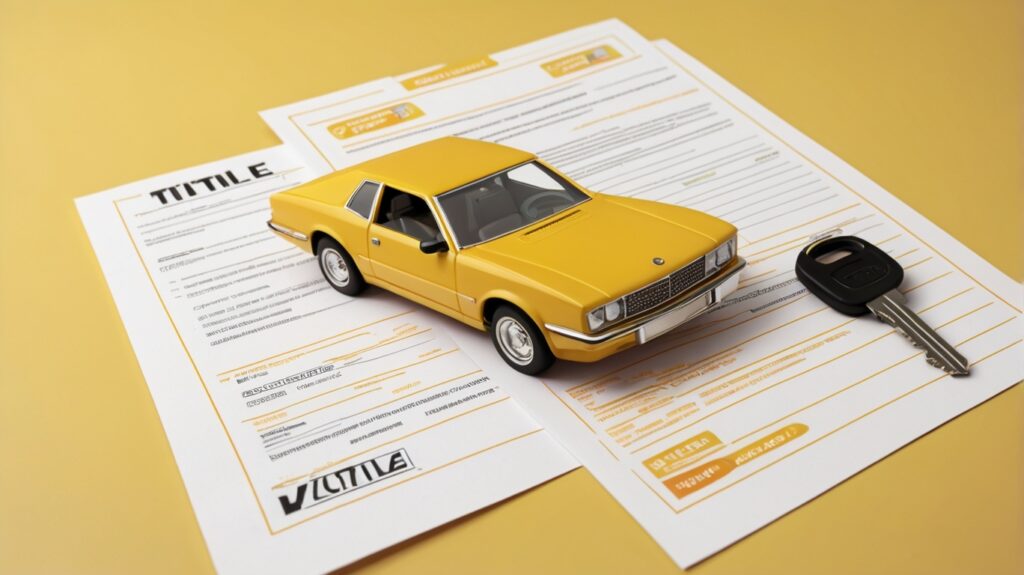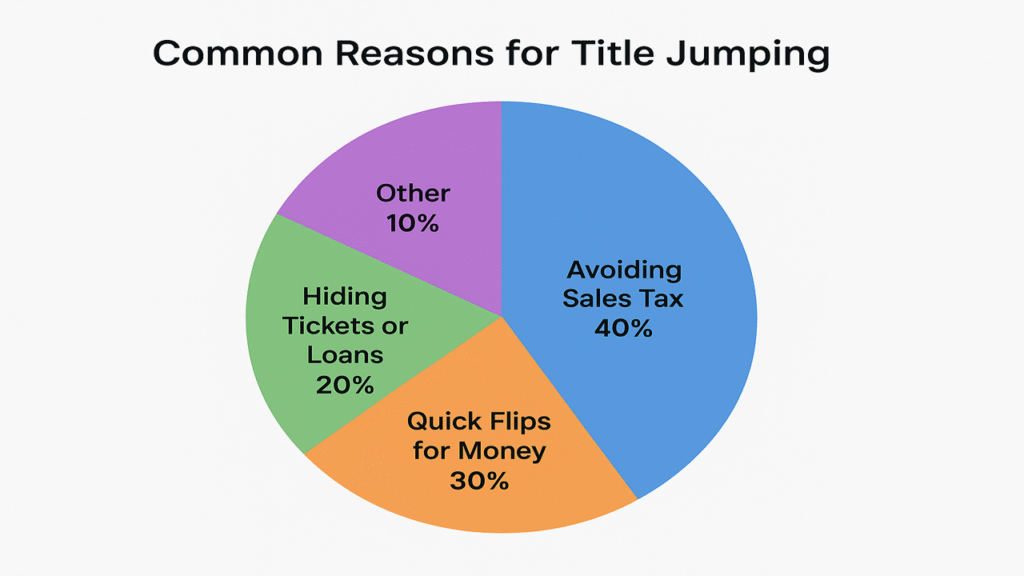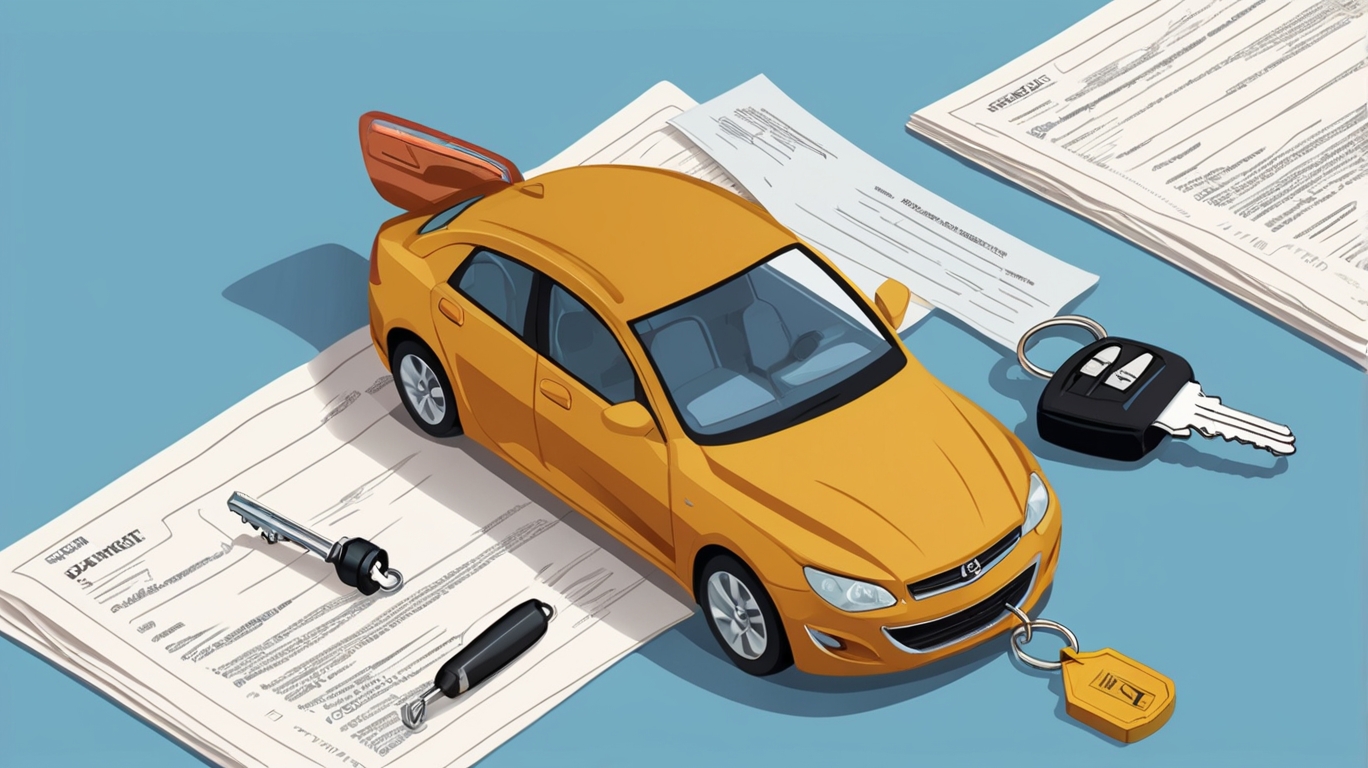Earn More, Stress Less — With MoneyForMore.
Buying a used car can be exciting, but there’s one big mistake that many people don’t even know about — it’s called Title Jumping. This happens when someone sells a car without putting the title in their own name first. It might seem like a small shortcut, but it’s actually illegal and can cause serious problems for the next owner. From confusion at the DMV to surprise fees or even losing the car, the risks are real and expensive.
Title Jumping doesn’t just break the rules — it hides the car’s real ownership story, making it harder for buyers to stay safe. In this guide, we’ll explain how this works, why it’s against the law, and what signs to look for before buying. You’ll learn how to avoid being tricked, what steps to take if it happens to you, and why legal ownership matters more than you think. Let’s make sure your next car purchase is smart, safe, and stress-free.
What Is Title Jumping and Why Is It Illegal?
Title jumping happens when someone sells a vehicle without ever registering it in their own name. On the surface, it might seem like a small paperwork shortcut — but legally, it’s serious offense in most states.
Skipping this step hides the car’s real ownership history, which creates confusion for the next buyer. In many cases, the buyer might face delays registering the car — or worse, be denied registration entirely.
Laws around vehicle titles exist to ensure a clear, documented chain of ownership. Each time a vehicle is sold, the new owner is required to register the title before they can legally sell it again. This process prevents fraud and protects buyers from hidden issues, such as unpaid loans or traffic violations tied to the previous owner.
Simply put, handling the title properly keeps the car market transparent and safe — for both buyers and sellers.
How Title Jumping Works in a Car Sale
Let’s look at an example: imagine someone buys a car but never puts the title in their name. Instead, they try to resell the car to someone else. The new buyer ends up with a title that still shows the name of the original seller — not the person they actually bought it from. That’s title jumping.
This creates a broken trail of ownership. The buyer now owns a car with no proof that the person who sold it to them was legally allowed to do so. This can be a big problem at the DMV, where proper documentation is essential for title transfers and registration.
Many people who engage in title jumping are trying to avoid paying sales tax, registration fees, or dealing with legal complications tied to the car. But no matter the reason, title jumping is illegal — and risky for everyone involved.
When buying a car, always check that the seller’s name matches the one on the title. If not, that’s a red flag.
Top Reasons People Get Involved in Title Jumping

People jump titles for a few main reasons — but none of them are worth the risk.
Avoiding Sales Tax:
By not registering the vehicle in their name, sellers skip paying taxes. This might save money in the short term, but it can lead to legal trouble if discovered.
Quick Car Flipping:
Some people buy cars with the intent to flip them fast for a profit. Rather than wait for proper title processing, they jump the title to speed things up — a shortcut that can backfire.
Hiding Legal or Financial Issues:
Sellers with unpaid tickets, loans, or liens on the vehicle might try to avoid putting the car in their name to hide these problems. But the next buyer could become responsible for these unresolved issues.
While these motivations might seem understandable, they all expose both parties — especially the buyer — to unnecessary risk.
Risks and Penalties of Title Jumping for Sellers
For sellers, title jumping isn’t just a bad idea — it can carry serious consequences.
Many states treat title jumping as a criminal offense, not just a paperwork error. Depending on the jurisdiction, penalties can include fines, vehicle seizure, and even fraud charges.
On top of that, sellers who are caught title jumping may find it harder to buy or sell vehicles in the future, especially if they become flagged by the DMV or law enforcement.
But beyond legal consequences, title jumping damages trust. Buyers count on accurate documentation to feel confident in their purchase. When sellers skip steps or hide information, it makes the whole transaction feel shady.
Being upfront, honest, and legal isn’t just the right thing to do — it protects your reputation and avoids major problems later on.

How Title Jumping Can Hurt You as a Car Buyer
If you’re the buyer in a title jumping situation, you’re the one most likely to get burned. The biggest risk? You may not be able to legally register the car. And if you can’t register it, you can’t drive it.
You could also become responsible for unpaid tickets, outstanding loans, or legal claims tied to the car — even if you had nothing to do with them. In some cases, buyers lose both the car and their money, with little chance of getting it back.
Fixing a jumped title can be a long, frustrating process. You may need to locate the original owner, get them to re-sign paperwork, or even hire a lawyer. That’s why checking the title — before you hand over any money — is critical.
How to Spot Title Jumping Before Buying a Car
| Warning Signs of Title Jumping | What to Do |
|---|---|
| Name on title ≠ Seller | Ask questions, walk away if unsure |
| Old transfer date on title | Verify with DMV |
| Scratched or missing info on title | Reject sale if unclear |
| Seller avoids ID matching questions | Don’t buy, stay safe |
Before buying, always inspect the title closely. The seller’s name should be printed clearly and match their photo ID. Check the date of the last title transfer — if it’s months old and still hasn’t been updated, that’s a red flag. Missing or altered information should also raise concern.
If the seller hesitates or gives vague answers about the title, walk away. Better safe than stuck.
Steps to Avoid Trouble Caused by Title Jumping
Want to protect yourself when buying a car? Follow these simple steps:
Review all documents carefully before closing the deal.
Ask for the seller’s photo ID and make sure it matches the name on the title.
Use a bill of sale that includes names, date, price, and vehicle details. This document helps you if a dispute arises.
Verify the title’s status through your state DMV website or a trusted VIN check service.
Never pay until you’re sure everything is legit. If something feels off, don’t be afraid to walk away.
Legal Ways to Transfer Ownership Without Title Jumping
Transferring a car title legally isn’t difficult, and it keeps everyone protected. The seller must sign and complete all parts of the title. In many states, both the buyer and seller should visit the DMV together to process the title change.
Some states now offer online title transfers, making it easier to complete the process safely and quickly. Following these legal steps ensures a smooth transfer of ownership and peace of mind for both parties.
Must Read Cerulean Blue
What to Do If You Bought a Car with Title Jumping
If you suspect you’ve bought a car with a jumped title, take action quickly:
Contact your local DMV to explain the situation. They may have a way to help fix it. Try to reach the original title holder. If they’re cooperative, they might be able to reassign the title correctly.
Consider speaking with a lawyer. In serious cases, legal help may be needed to resolve the ownership issue.
Document everything. Keep receipts, messages, and photos — they can be valuable if things escalate. With patience and the right steps, you may be able to sort things out and legally register the car.
Conclusion
Buying a car is an exciting milestone, but one wrong move with the title can turn it into a headache. Title jumping might look like a shortcut, but it’s illegal and risky.
If the name on the title doesn’t match the seller, that’s your cue to walk away. Ask questions, check the paperwork, and take your time. A clean title is your best protection. Stay alert, stay informed, and you’ll avoid title jumping — and drive away with confidence.
FAQs
Q: What is title jumping?
A: Title jumping is when a person sells a car without transferring the title into their own name. It’s illegal and can cause major problems for buyers.
Q: Is title jumping legal?
A: No, title jumping is illegal in every state. It can result in fines, penalties, or even criminal charges.
Q: Why do people jump car titles?
A: Often to avoid paying taxes, flip the car quickly, or hide legal issues like liens or tickets.
Q: Can I register a car with a jumped title?
A: It’s very difficult. The DMV may reject the application or require additional documentation, sometimes even legal intervention.
Q: What should I do if I unknowingly bought a car with a jumped title?
A: Start by contacting your DMV. You may need to work with the previous owner or get legal help to resolve the issue.
Q: How do I avoid buying a car with a jumped title?
A: Always make sure the seller’s name matches the one on the title, and double-check all documents before paying.
Q: Can title jumping happen at a dealership?
A: Yes, although rare, dishonest dealers may also engage in title jumping. Always verify ownership documents and check the business’s credibility.
Stay Tuned MoneyForMore




